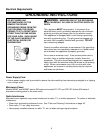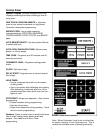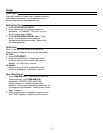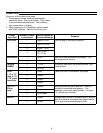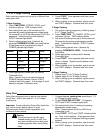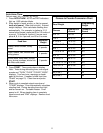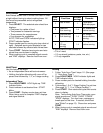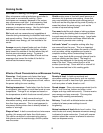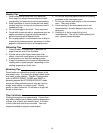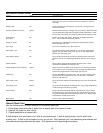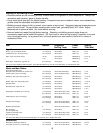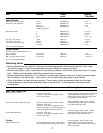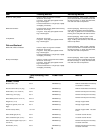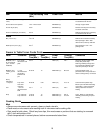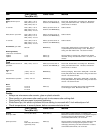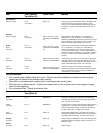
14
Heating Tips
1. When determining cycle time for a particular
food, begin by using minimum time and check
occasionally for doneness to avoid overcooking.
2. Small quantities of food or foods with low water
content may burn or dry out and become hard if
cooked too long.
3. Do not cook eggs in the shell. They may burst.
4. Foods with nonporous skin or membrane such as
apples, potatoes or eggs should be pierced to
prevent bursting when heated whole.
5. Do not pop popcorn in microwave oven unless in
a special microwave popcorn accessory or unless
popcorn is labeled for use in microwave ovens.
6. Do not use recycled paper products for cooking
purposes in the microwave oven.
7. Do not use narrow neck bottles in the microwave
oven. They may shatter.
8. Home canning in the microwave oven is not
recommended. Harmful bacteria may not be
destroyed.
9. Heating oil or fat for deep frying is not
recommended. The hot fat could suddenly boil
over, causing severe damage.
Defrosting Tips
1. Freeze foods in a single layer, if possible, no
larger than the size of the turntable.
2. If some areas of the foods thaw faster than
others, cover with small pieces of aluminum foil
to slow down or to stop the heating process.
3. It may be necessary to increase or decrease the
cooking time in some recipes, depending on the
starting temperature of the food.
Browning Tips
Some foods are cooked too quickly to brown in the
microwave oven. For more eye appeal, these foods
may need a color additive. Paprika, Coating mixes
such as MICRO-SHAKE, SHAKE and BAKE, or
browning sauces like KITCHEN BOUQUET, steak
sauce and Worcestershire sauce may be used on
chops, meat patties, or chicken parts. Roasts,
poultry or ham cooked for 15 minutes or longer will
brown on their own.
Time Variations
Cooking times given are approximate. Factors that
may affect cooking time include starting temperature,
volume, size of food, and utensils used. It is better
to first undercook food than overcook. Time can
always be added to properly cook recipes.



